Events
Electoral Assembly of the Members of the Lithuanian Academy of Sciences: The Next President Has Been Elected!
03 11 2025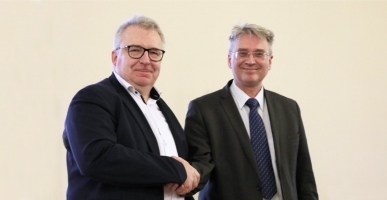
On 28 October, members and members emeriti of the Lithuanian Academy of Sciences gathered for the electoral assembly to elect the next president of the Academy. At the beginning of the meeting, Prof. Jūras Banys, the president of the Lithuanian Academy of Sciences, congratulated the outstanding Lithuanian literary scholar Prof. Viktorija Daujotytė on her milestone birthday and conveyed the request of the National Academy of Sciences of Ukraine for a network hub.
After that, the assembly was chaired by Academician Gintautas Tamulaitis, who reminded the audience that both active and emeriti members were participating in the election of the president. There are 181 of them in total, but the electoral assembly was attended by 144 members. If a candidate does not receive 91 votes even in the third round of voting, a new election would be organised. A vote counting commission was formed, which consisted of academicians Alvydas Jokubaitis, Ramūnas Garunkštis, Vytautas Basys, Giedrė Samuolienė, and Olga Kurasova.
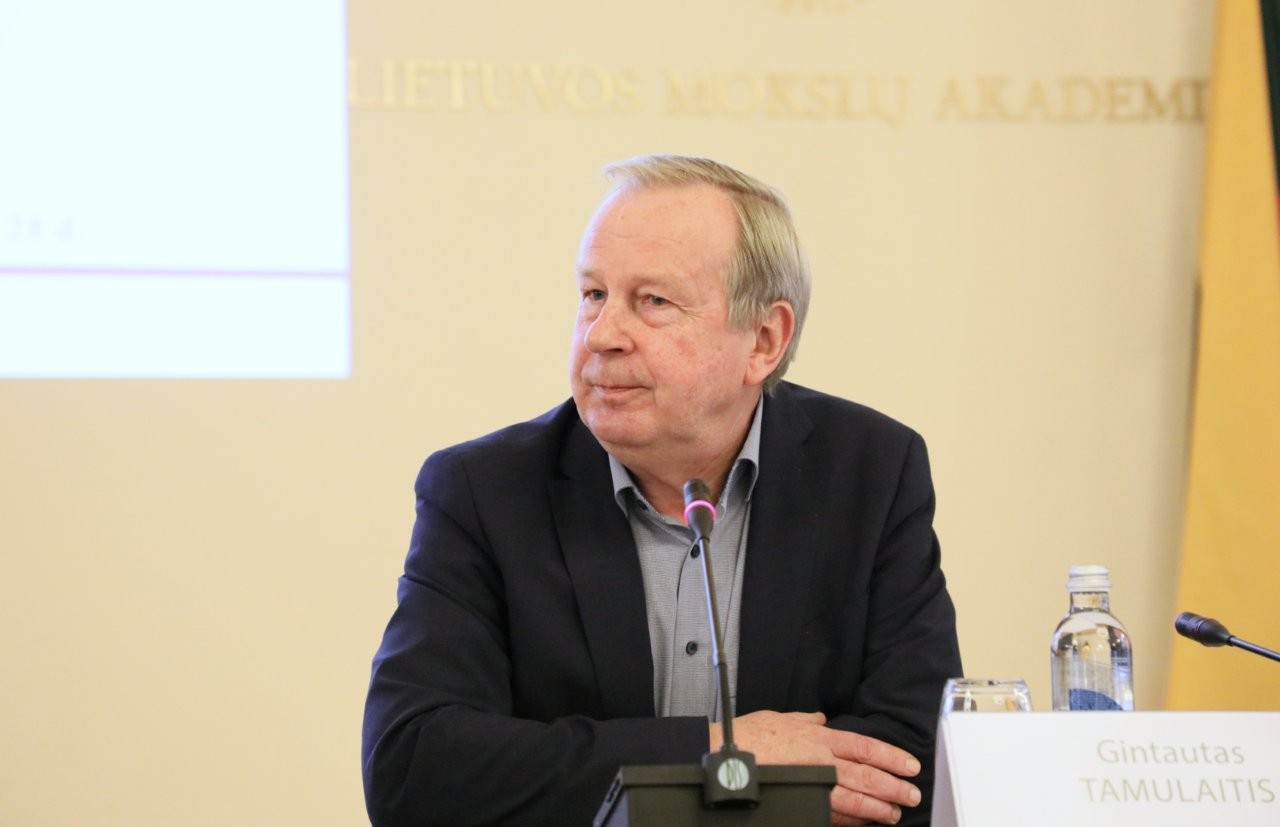
The chair of the meeting invited the candidates for the presidency of the Lithuanian Academy of Sciences – academicians Gintautas Dzemyda, Vytautas Nekrošius, and Artūras Žukauskas – to present their programmes of activity.
Prof. Gintautas Dzemyda emphasized that the state has expectations, and the Academy must justify them. According to him, interdisciplinarity, i.e., harmony between scientific fields, is of great importance. The Academy's leadership must take care of its community: communicate with academicians, duly honour scientists who are of merit to Lithuania, and provide them with financial support. Furthermore, in the candidate’s view, academicians should be active in the processes of reforming education and science, conduct expert assessments, in which the state should invest. The president’s duty is to attract additional funding. He proposed organising regular meetings between the members of the Lithuanian Academy of Sciences, the government, and the Seimas (the parliament), establishing close ties with Lithuanian universities, and becoming their indispensable allies. Prof. Dzemyda would very much like to strengthen cooperation with regions, encourage academicians to visit schools, promote scientific achievements, and reach the wider public as effectively as possible. In the field of international cooperation, it is necessary to activate bilateral exchanges, encourage visits to Lithuania of the foreign members of the Academy, and expand ties with Lithuanian science abroad. It is also necessary to strengthen the staff of the Lithuanian Academy of Sciences and provide opportunities for them to improve their qualifications. The Wroblewski Library of the Lithuanian Academy of Sciences could serve as an important tool for enhancing the prestige of the Academy in society. The vision of the Lithuanian Academy of Sciences for the future is an organization that actively participates in the life of the country. Responding to the question of how to consolidate the role of the Academy in shaping science policy in Lithuania, Prof. Dzemyda noted that the situation would improve if some academics became advisors to ministers.
The next to present his programme was Academician Vytautas Nekrošius. He began his address by responding to Prof. Dzemyda and stating that he would not encourage academicians to seek the status of political advisors. Becoming an advisor means losing some independence. In Vytautas Nekrošius’s view, the Lithuanian Academy of Sciences must maintain an independent position. The candidate emphasised his motto, ‘For you as for myself’. Prof. Nekrošius maintained that the support of academicians from various scientific divisions encouraged him to run for office. He intends to work without revolutions, through discussions with his colleagues. Although this makes the process take longer, the results are better. He noted that the Academy’s scientific divisions became stronger. It is imperative that their activities receive ongoing support. No amount of public relations will help if there is no activity. If the Lithuanian Academy of Sciences responds to the most relevant issues, its ties will also strengthen. Working groups need to be established to prepare the Academy's position for the general public. In addition, the candidate would like to see more women in the Academy. Speaking about the prospects for international relations, he said that, first and foremost, it is necessary to communicate with academies that recognise Western culture and democratic values. The Academy must bring together the best people from all universities and research institutes. In Vytautas Nekrošius’s opinion, the Young Academy of the Lithuanian Academy of Sciences is the most successful project, and this bridge between generations should be further made stronger. To strengthen ties with the regions of the country, another vice-president should be appointed to take responsibility for this. The candidate also suggested establishing a club for members emeriti and involving them in the daily activities of the Lithuanian Academy of Sciences. In his summing up, Prof. Nekrošius said that protecting the interests of the Academy and academicians would be one of his most important goals.
The third candidate, Academician Artūras Žukauskas, commenced his address by saying that the Lithuanian Academy of Sciences must strive for success. It is capable of influencing society more significantly. We have wisdom, which is a fundamental resource, as also the competence to fully apprehend, put into practice, and manage scientific knowledge. At present, it is deficient in every sector throughout Lithuania. According to Prof. Žukauskas, we must be more active. This requires creating a vision for a successful organization. The public needs to see what academicians are doing. Secondly, there is a lack of a communication strategy. No changes are possible without it. Science popularisation is yet another important aspect. In this area, it is necessary to have a clear strategy and identify target groups. Prof. Žukauskas emphasised that today it is particularly important to strengthen the influence of science in the state, as economic progress depends on it.
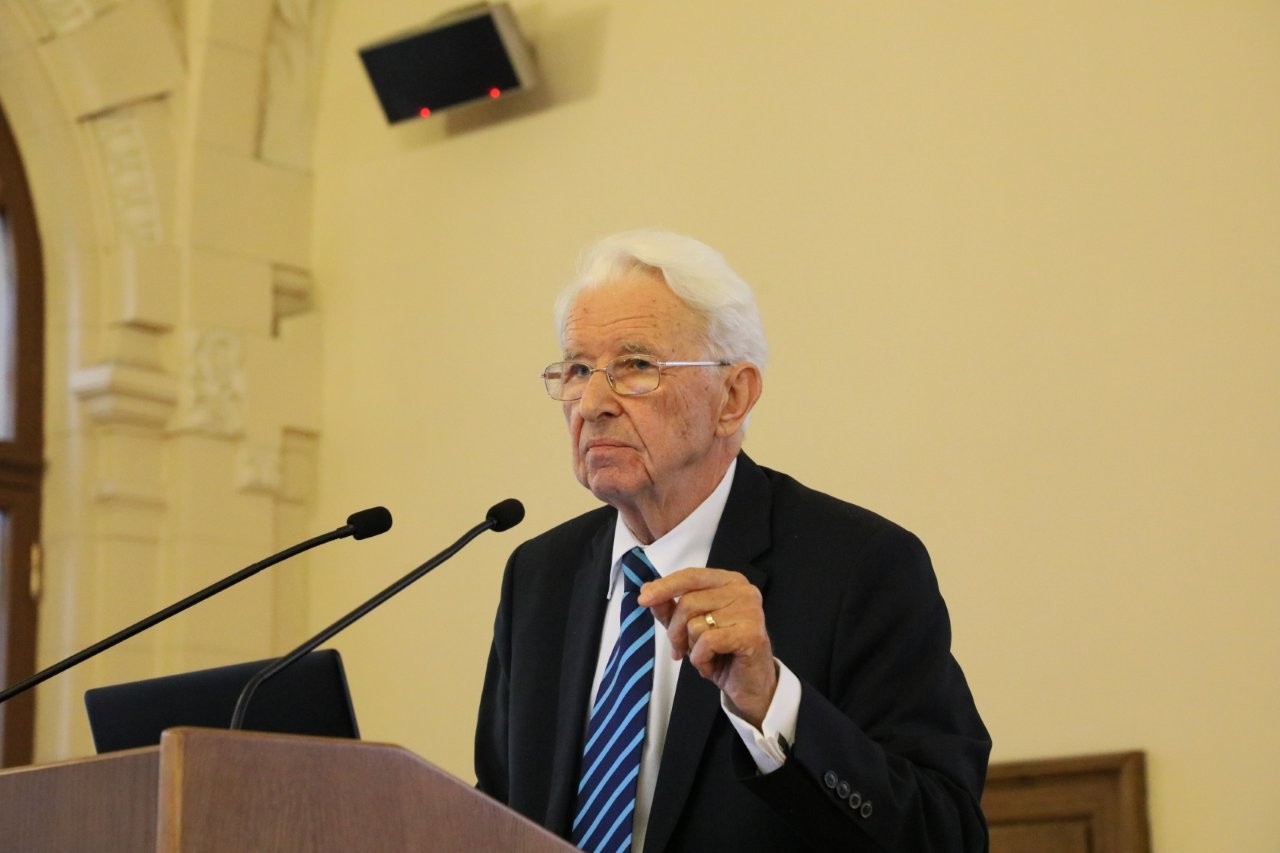
After the candidates introduced their principles of activity, the discussion was opened by Academician Benediktas Juodka. He reminded the audience that he had been a member of this institution for almost forty years, making him the longest-serving member. He emphasised that there was no other institution in Lithuania with such a concentration of intelligent, educated people, except perhaps the Seimas. All three candidates have extensive administrative experience and are qualified to be the president. Yet when considering his personal vote, he noted that since 1946, only six presidents had led the Lithuanian Academy of Sciences, and all of them were either physicists or chemists and biochemists, so maybe we should pay tribute to the humanities and social sciences?
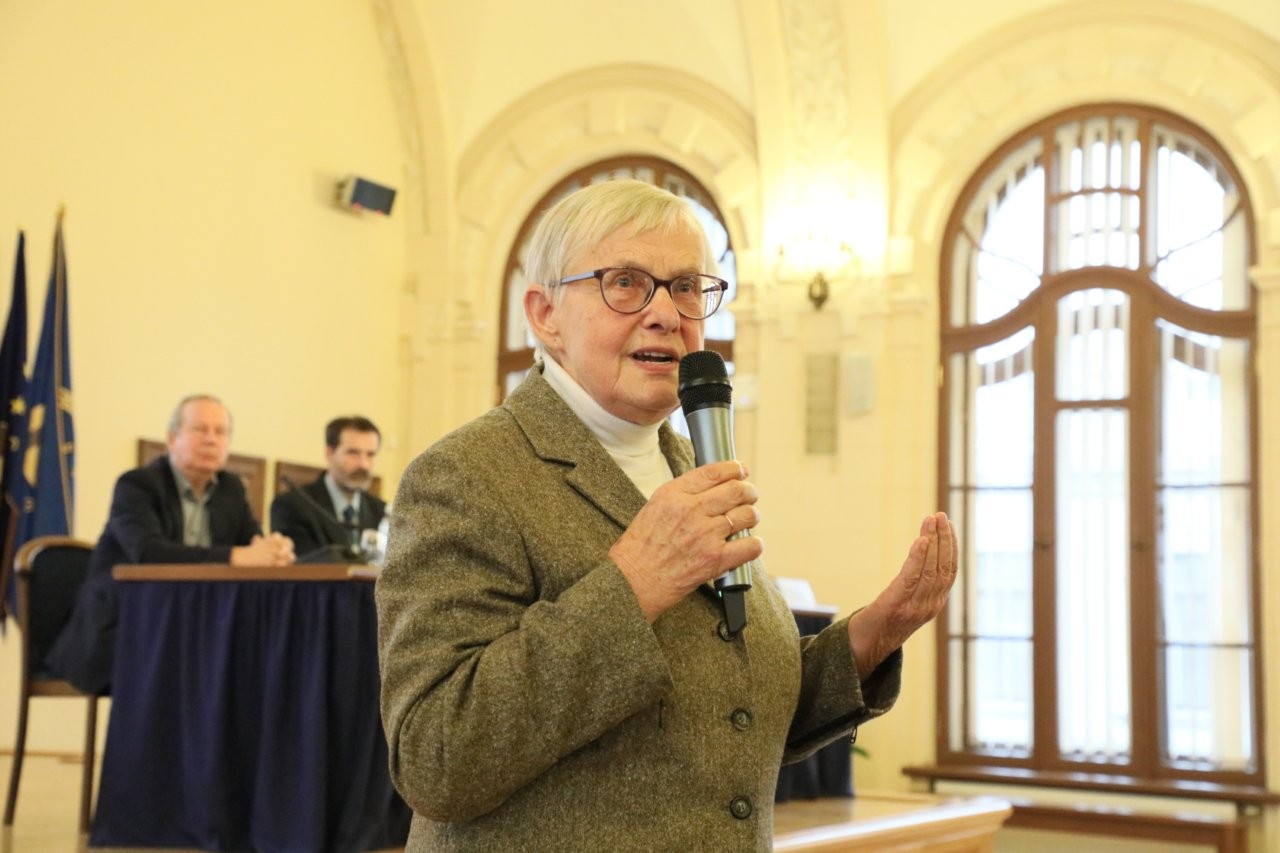
Academician Prof. Viktorija Daujotytė thanked the outgoing president and vice-president. In her opinion, theirs was the right kind of leadership, without revolutions. She also voiced some of her insights. She was convinced by the research field of Vytautas Nekrošius, a candidate for the president of the Lithuanian Academy of Sciences. According to her, it is important that he is a specialist in ancient Roman law. His standpoint is linked to the oldest legal system that is of great importance for Europe (in propria persona,‘personally, at one’s own risk’). ‘Therefore, the academy can expect to be cared for in the same way that the candidate cares for his large family, bringing home a mammoth every week,’ summarised Prof. Daujotytė.
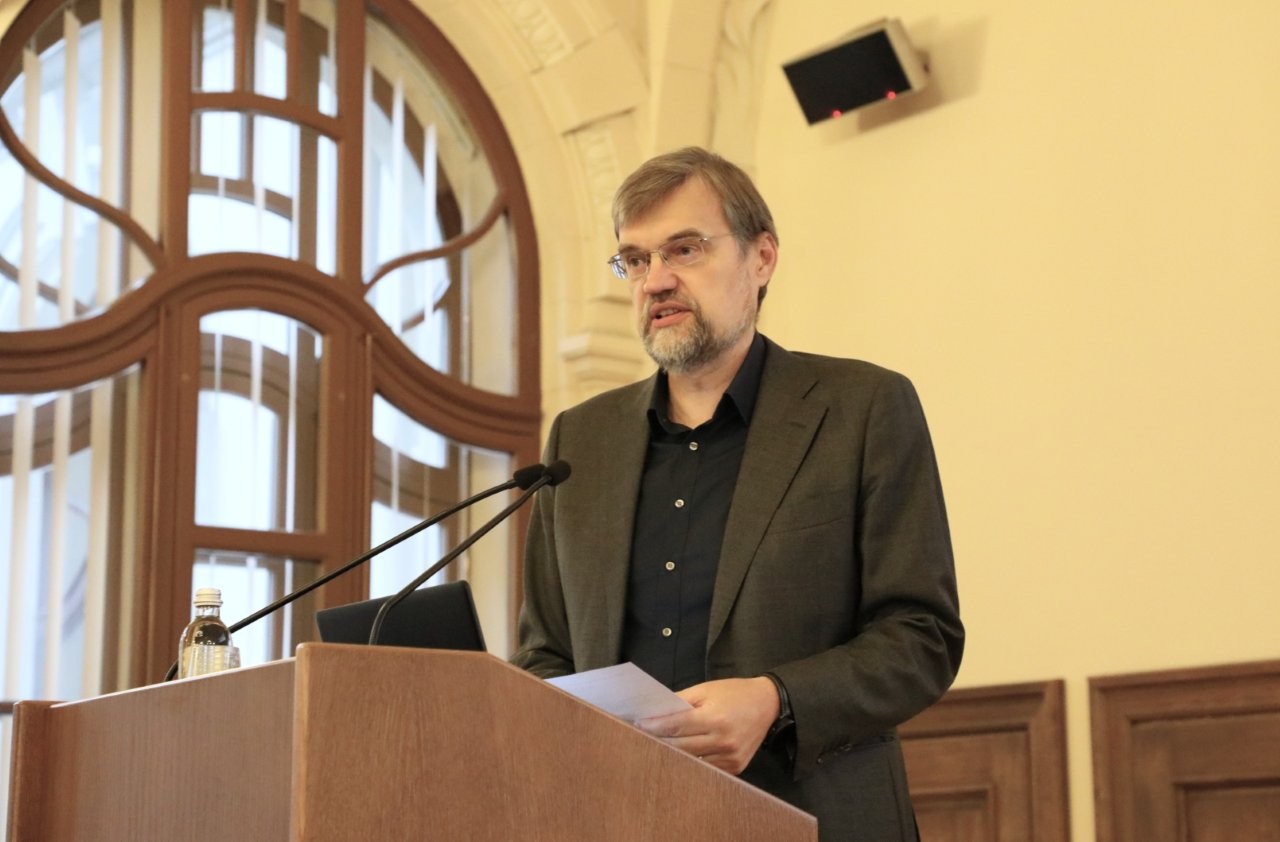
After the chair of the vote counting commission announced the results of the first round of voting, it became clear that Gintaras Dzemyda and Vytautas Nekrošius had advanced to the second round. In the second round of voting, the majority of votes went to Prof. Vytautas Nekrošius, who was thus elected the next president of the Lithuanian Academy of Sciences. In his short acceptance speech, Prof. Nekrošius thanked all members of the Lithuanian Academy of Sciences for their trust and noted that he would strive not only to maintain that trust but also to consolidate it.
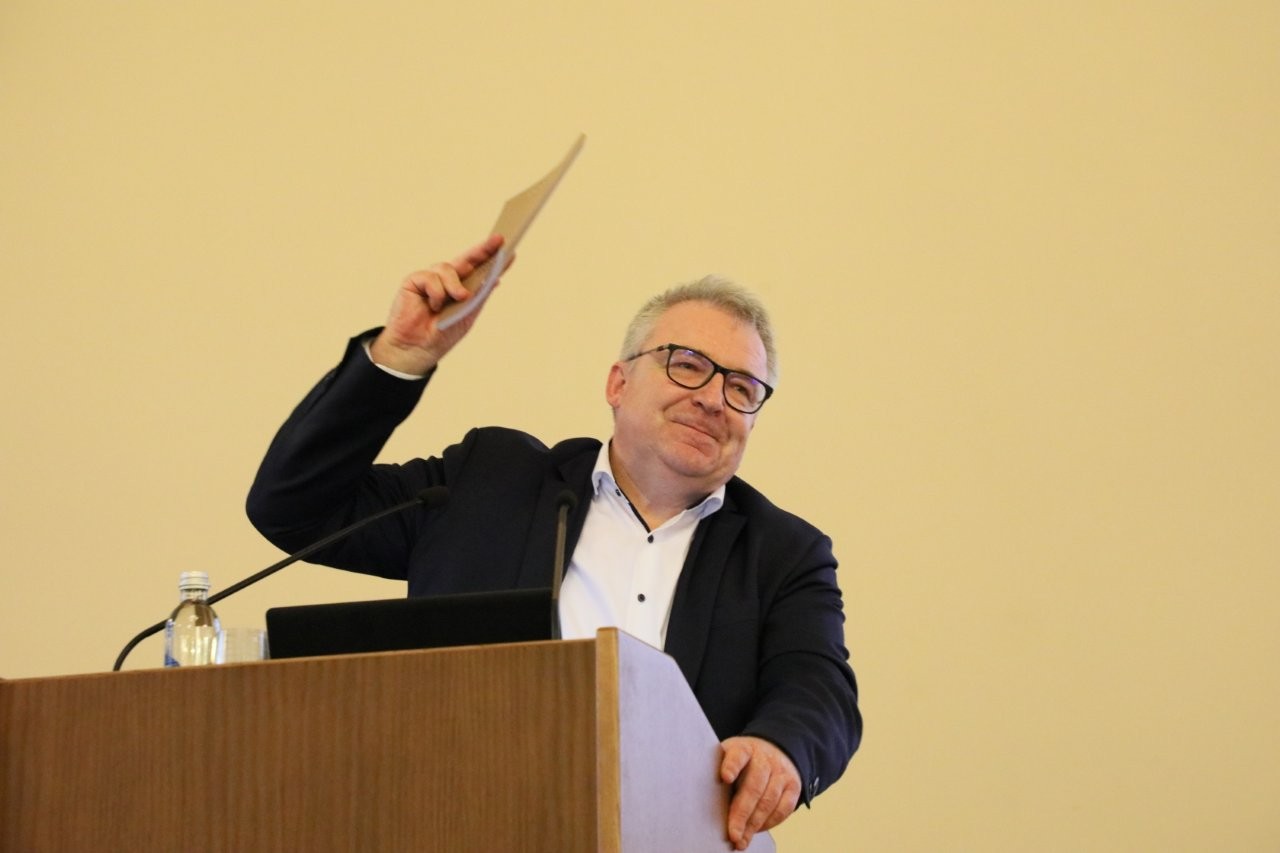
Dr Rolandas Maskoliūnas, Chief Specialist for Public Relations
Translated by Diana Barnard
Photography Virginija Valuckienė
